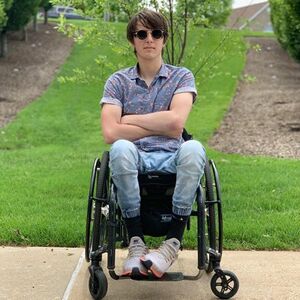Mitchell Herndon
Mitchell Herndon | |
|---|---|
 Photo of Mitchell Herndon, taken from his X (twitter) account. | |
| Born | Unknown |
| Status | Deceased |
| Died | 2nd October, 2019 |
Mitchell Herndon was a courageous teenager who battled a rare and devastating neurological disorder. Born in Missouri, Mitchell was diagnosed with a genetic mutation that affected only a few individuals worldwide. Despite the challenges he faced, he made the selfless decision to donate his body to science, hoping to contribute to the advancement of research on neuro-muscular diseases and potentially save lives.
Early Life and Diagnosis
At the age of 12, Mitchell, previously a healthy and athletic child, began experiencing difficulties in moving his legs. After a series of medical evaluations, he was diagnosed with a rare mutation of the ACOX1 gene, which had previously been identified in only one other person—a teenage girl in South Korea unable to communicate. Due to the extreme rarity of the condition, it had not yet been named.
Progression of the Disease
Over the course of seven years, Mitchell's condition gradually worsened, depriving him of his ability to walk, hear, and eventually see. He faced multiple relapses and hospital visits, relying on physical therapy and medications to regain some mobility. However, a relapse in the fall left him confined to a wheelchair.
Despite the immense challenges, Mitchell maintained a positive outlook on life. He used humour to lighten the mood during his hospital stays, cherished time spent with his siblings, and pursued his studies in political science and theology at St. Louis University whenever his health allowed.
Contributions to Medical Research
In May 2019, Mitchell's story was featured in an NBC News Digital documentary, which shed light on his unique experiences living with a mysterious disease. The documentary garnered widespread attention, reaching millions of viewers worldwide and raising awareness about Mitchell's condition.
Dr. Hugo Bellen, a researcher specialising in genetics and neurobiology, conducted studies on the mutation affecting Mitchell using fruit flies. His research identified a potential treatment—a powerful antioxidant called NAC-Amide—that showed promise in halting the progression of the disease. However, the medication had not yet received approval from the Food and Drug Administration (FDA) for use in patients.
Mitchell's neurologist, Dr. Bob Bucelli, collaborated tirelessly with the FDA to establish a protocol for administering the medication safely to Mitchell. Unfortunately, the approval came too late. As Mitchell's condition rapidly deteriorated, the FDA granted permission to try the drug only moments after an MRI revealed the disease had spread to his brain. With irreversible brain damage, it was no longer feasible to administer the medication. Mitchell's family made the difficult decision to remove him from life support, honouring his expressed wishes.
Legacy and Future Impact
Although Mitchell's journey ended tragically, his contributions to medical research and the understanding of his condition continue to make an impact. Dr. Bucelli identified another patient with a similar mutation in Ohio, and he plans to share the research conducted on Mitchell with the physicians treating that patient. This collaboration offers hope for the next individual affected by this rare genetic disorder.
Dr. Bellen has submitted the first-ever scientific paper on Mitchell's specific mutation for publication. He believes that there may be more patients with the same condition waiting to be discovered. In the paper, he proposes naming the disorder "Mitchell Disease."
By donating his body to Washington University in St. Louis, Mitchell's selfless act has provided invaluable resources for the research community. His contribution will not only advance knowledge about his own disorder but also potentially benefit individuals with other neurodegenerative conditions, such as amyotrophic lateral sclerosis (ALS), Alzheimer's, and Parkinson's diseases.
Mitchell's parents take solace in knowing that their son's legacy will extend beyond his lifetime. They believe that his generosity will continue to support medical research and contribute to finding cures for his condition and others like it. Mitchell's memorial service was on October 12, 2019, where his Dad Matt Herndon shared a eulogy.
